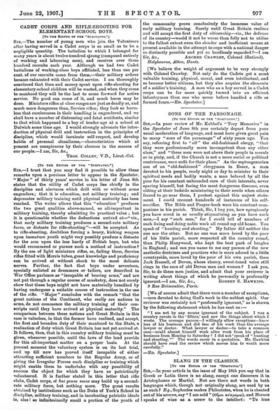[To TIM EDITOR or TOE SPZOTATOR.'] trust that you may
find it possible to allow these remarks upon a previous letter to appear in the Spectator. " Major " of thirty years' service in his letter of June 8th states that the utility of Cadet corps lies chiefly in the discipline and alertness which drill with or without arms engenders ; that it is education, not military training ; and deprecates military training until physical maturity has been reached. The writer allows that this "education" produces the two great qualities above-named, so all-important in military training, thereby admitting its practical value ; but it is questionable whether the deductions arrived at—" viz., that early military training produces a second-rate military force, or distaste for rifle-shooting "—will be accepted. As to rifle-shooting, doubtless forcing a heavy, kicking weapon upon immature youth might very possibly produce a distaste for the arm upon the less hardy of British boys, but who would recommend or pursue such a method of instruction P By the use of light miniature rifles, or, failing them, Service rifles fitted with Morris tubes, great knowledge and proficiency can be arrived at without shock to the most delicate nerves. Further, the fact that boys under seventeen, specially enlisted as drummers or tailors, are described in War Office parlance as "incapable of bearing arms," and are not put through a regular course of musketry, does not surely show that these boys might not have materially benefited by having undergone a suitable course of instruction in the use of the rifle. "Major" concludes with the remark "that the great nations of the Continent, who really are nations in arms, do not commence the military training of their con- scripts until they have arrived at physical maturity." The comparison between these nations and Great Britain in this case is valueless, in that the former have realised, and accept, the first and bounden duty of their manhood to the State, a realisation of duty which Great Britain has not yet arrived at. It follows, then, that in this country military training must be given, whenever possible, until the laws of the land provide for this all-important matter on a proper basis. At the present moment the voluntary system is on its last trial, and up till now has proved itself incapable of either attracting sufficient numbers to the Regular Army, or of giving the Irregular Forces such discipline or training which might enable them to undertake with any possibility of success the object for which they have so patriotically volunteered. It is farther stated in this letter that rifle clubs, Cadet corps, et hoc genus crane may build up a second- rate military force, but nothing more. The great results obtained by institutions such as the Duke of York's School in discipline, military training, and in inculcating patriotic ideals in, alas ! so infinitesimally small a portion of the youth of the community prove conclusively the immense valve of early military training. Surely until Great Britain realises and will accept the first duty of citizenship—viz., the defence of its country—would it not be worse than folly not to utilise to the fullest extent even the slender and inefficient means at present available in the attempt to cope with a national danger so distinctly possible and yet so heedlessly regarded P—I am Sir, &a., AnonEn CRAWLEY, Colonel (Retired).
Holybourne, Alton, Hants.
[We believe the weight of argument to be very strongly with Colonel Crawley. Not only do the Cadets get a most valuable training, physical, moral, and even intellectual, and so become better citizens, but they also acquire the elements of a soldier's training. A man who as a boy served in a Cadet corps can be far more quickly turned into an efficient infantryman than one who never before handled a rifle or formed fours.—En. Spectator.]










































 Previous page
Previous page